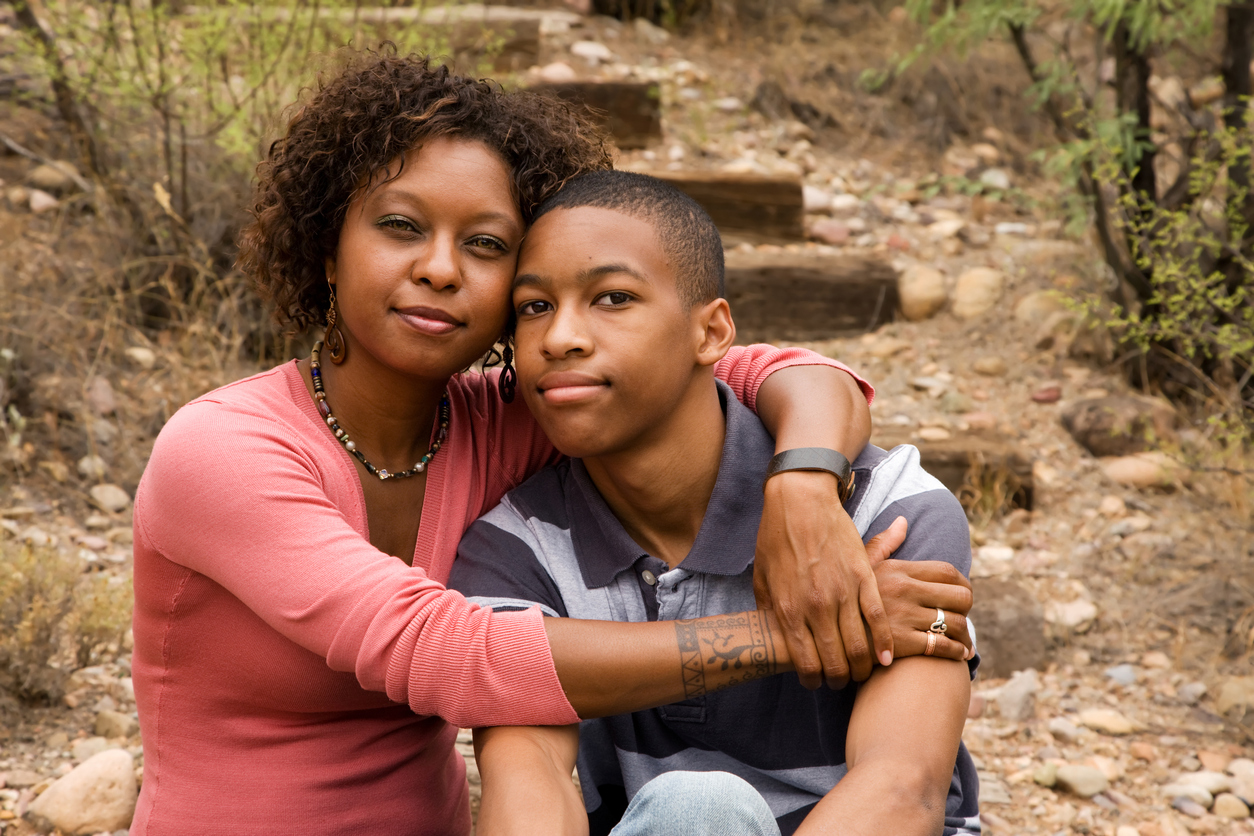AKA KIDS WHO SIDE WITH THE ABUSER
By the time children pull away from their mothers, they’re profoundly wounded. They wouldn’t pull away otherwise. On a deep level they desperately want to be close to her. Those loving feelings may be buried under huge piles of emotional injury, but they’re still there. They distanced themselves because they couldn’t stand the huge price the abuser made them pay for being close to her; or they couldn’t tolerate living in the fear that the abuser would hurt them when he was hurting her; or they couldn’t take the pain of how unjust and unfair it all was, so they escaped all that pain by deciding the abuse was her own fault.
Sometimes they even start to look like they hate her. They start to say the same kinds of demeaning and hateful things to her, and about her, that their father does. They start to make these ugly facial expressions that look disturbingly similar to his.
But all of this has very little to do with their genuine resentments towards her. That’s not what genuine resentment looks like. (They may have quite a bit of that inside them too, but that’s a different question which I’ll talk about farther down.) What you’re seeing is the outcome of a kid witnessing years of abuse, and then being deliberately messed with in all kinds of mental ways by the perpetrator of that abuse.

I hear stories over and over again from abused moms about their teen boys who are getting more and more vicious towards her, to the point where she’s not sure she how much longer she can have him living in the home. But periodically he snuggles next to her on the couch, or falls asleep in her bed, aching to be close to her and feel safe in her protection.
You might say, “Really? The same boy?” I understand that reaction; it’s hard to see the two sides of this boy as the same person. A boy who is doing this extreme lurching back and forth gives us a window into what’s going on to some degree inside of all kids who have an abusive father who is recruiting them onto his side.
When we think about the rebuilding of relationships, whether with boys or with girls, it’s valuable to keep in mind this teen boy I just described, nasty and hateful toward his mother and then suddenly grabbing onto her for dear life.
THE REBUILDING PROCESS
First phase: The child is emotionally unreachable
If the child does pull away from you completely, there will be a period when there’s not a lot you can do. Attempting to pressure or beg a child to come back emotionally (or to literally come back home) will tend to play into the abuser’s hand because it can push the kid further away.
During this period do stay in touch, but spread your contacts out. If the child is still accepting texts or FB messages from you, or whatever it may be, send a message once in a while. Keep those lighthearted, even though you of course aren’t feeling that way. Give a few points of news from your life and make it sound like you’re doing okay, even if you’re quite broken up inside. Your child wants signs that your life is moving forward and that you’re progressing toward a happier place. Kids crave these signs because:
* they feel so guilty about their distance from you (and that guilt will not propel them back toward you; even though it may seem contradictory, those guilt feelings actually push them further away)
* their father indoctrinates them with the view that you’re an impossibly unhappy, embittered person who is always out to find what’s wrong with things
* they want to believe in their own capacity to heal, and if they see you healing that helps them to have faith that someday they will too

Ask about their lives even if you know they won’t respond; it’s a way of saying that you care about what’s going on with them. Aim for a tone that pretends that you’re having normal communication with them, even though you obviously aren’t.
Avoid sadness or anything that the child can seize on as self-pity. That means it’s best not to say how much you miss them or how hard it was not to see them on their birthday. Those feelings are real and justified, but expressing them won’t help now; those have to come way later in the process.
Instead, say positive things like, “You’re always in my thoughts,” without letting it get heavy.
An abusive man can’t be a model for his children of what they need to work toward. So try to be a role model for them by talking about your friendships, the ways you’re taking care of your health, the things you’re looking forward to. In this way you’re sending them the message that these are the things that matter in life. The abuser can offer them a sense of superiority, can offer them money and material luxuries, and can offer them inappropriate freedoms. But he can’t offer them the things that really matter in life. You can remind them of those things simply by describing the role they play in your own life.
But don’t preach these ideas at them. Just try to live a life that illustrates those ideas, and share about your life.
If there’s any chance that an actual paper letter will get through to them, send one every few months. A physical artifact is different from an online message. It’s like having a piece of you in their hands.
I can’t answer the question of how often to write. It’s something you have to feel out. The goal is to make it often enough that the child knows you’re there and haven’t given up, but far enough apart that it doesn’t feel like pressure or pleading for contact with them.
If the child tells you not to contact them, I believe it’s best to respect that. But if they haven’t said that explicitly, keep sending them things even if they never respond, and no matter how long goes by.

Second phase: The child makes small contacts with you
It might begin with a short text about a logistical issue. (“Do you know where my birth certificate is?”) Or a simple, “Hi, how are you?”
Your heart naturally starts to race, and you want to jump all over this. Fight hard against that temptation, though. Instead, send a casual-sounding response along the lines of, “Hi, it’s good to hear from you.” And then answer the question they’re asking and leave it at that.
Move slowly. I’ve observed that kids are easy to scare off during this phase. Let them move toward you at their own pace.
This may almost feel harder for you than having them out of touch altogether. It’s like having your love for them dangled in front of you. Gather your strength, because this period is crucial.
If they ask to get together with you, do your best to have that meeting (and the next few, if more meetings follow) be lighthearted. Don’t try for a super-long hug, don’t start telling them anything about what their father is really like, do your best not to cry. Ask yourself the key question, “How do I handle this in a way that will make them want to see me again?”
You’ll need to take it on faith that your child has missed you a lot. Believe me, they have. But they’re not going to say that the first few times they see you, and it’s a mistake to bring it up (as in, “Have you missed me?”).
Believe it or not, it’s actually best not to ask them right away if they’d like to get together again. They don’t want to be put on the spot about that. Wait a few days, maybe even a week. And even then, make it more like an open door than an invitation, as in, “It was great to see you. Let’s do it again when the time is right for you.”

A quick side note: As you’re reading this, you may be thinking, “But Lundy, this is all so incredibly unfair. I’m their mother! They owe me so much better than this!” I understand how you feel. But this moment isn’t about fair and unfair; it’s about what works and what doesn’t work when dealing with a very traumatized, brainwashed, and confused child. Forget fairness for now and stay focused on getting this relationship going again.
Third phase: Some degree of real reconnection starts to happen
I’m currently in touch with three or four mothers whose relationships with a child are in this phase, and they are extremely happy. It’s a wonderful thing.
But you need to stay cautious.
For example, your child is likely to test the waters by telling you some things that they’re upset at their dad about, or things they’re starting to realize about him. It’s so tempting at this point to say, “Oh my God, it’s such a relief that you’re getting what a vicious bastard he is!” You will lose the ground you’ve gained if you go there. (This kind of maneuver works for the abuser, but it does not work for the mom – it’s a completely different set of dynamics.)
Keep your own feelings and history out of it for now, and stay focused on the child’s feelings. “That sounds hard. He shouldn’t treat you that way. You don’t deserve that.” Those kinds of statements are all you want to say. It’s fine to (calmly) name his behavior as wrong, but don’t say anything bad about him as a person (that he’s selfish, that he’s abusive, etc.).
If your child continues to move closer – and it’s likely to be quite gradual – there will come a point where you’re connected enough that you can say, “I’ve had some similar experiences with your dad to what you’re dealing with, as you may remember. If there comes a time when it would be helpful to you to know what happened, I’m fine with telling you.”
Try to say nothing more than that. They’ll let you know what they’re ready to deal with, and when.

I realize that what I’m asking you to do takes almost super-human strength, and that these are not fair things to ask. But I’ve watched a lot of moms go through this process. And I’ve seen quite a number of successes. Unfortunately, I’ve also seen quite a few examples where the child’s approach didn’t last long and he or she was gone again. I want to see you succeed.
Can Other People Help Reach the Child?
I’ve seen occasional times when there was a good effect from having a relative connect to the child if it’s a relative the child really likes. What I’ve seen most helpful is when it’s a sibling – in other words, one of your other children.
Again, though, it has to be done without guilt or pressure. When a grandparent or an aunt or uncle says, “Your mother misses you terribly,” the child just grows more resentful. It’s best if they just work on connecting to the child, either through several messages or through getting together, without mentioning the rift between you at all. They can mention having seen you, or casually drop positive news from your life, but leave it at that. With luck the child will eventually start to bring things up, and then the relative can help them make sense out of it all.

A sibling can sometimes get away with being a little more direct, but it depends on how close the kids are to each other. It’s best to even for the sibling to think of it as a process of trying to calmly guide a swimmer to safety who has gotten caught in a dangerous riptide. (I find this analogy helpful because when you fight hard against a riptide, you make things more dangerous, not better).
Owning What You Need to Own
This is going to be my last point, but it’s another tough one. Kids who grow up around a domestic abuser accumulate a lot of resentments toward their mother, not just toward the abuser. Many of these resentments are the products of distortions caused by the abuser, as I’ve pointed out. But they aren’t all. The kids have some justifiable complaints. (I can say this because kids have justifiable complaints against any parent. My children certainly have valid grievances against me, and I’ve needed to own those.)
Now, when you’ve been the target of all this terrible abuse, and then on top of that you’ve had your children driven away from you, the last thing you feel like doing is being the one to apologize. And I’m certainly not asking you to apologize for anything their father did, since that’s beyond your control. But try to push through all that hurt enough to be able to offer sincere apologies for actions of yours that you do feel bad about, and for things you could have done better. Kids really need this from their mothers.
Plus, it helps distinguish you from their abusive dad, who is never going to own anything in a sincere and heartfelt way. In other words, one of the ways in which you can remind them how different you are from him is by demonstrating your ability to accept responsibility for your actions, and to give them room to have hurt feelings and resentments about those things. He’ll never do that.
Don’t look for apologies in return from them until a long time from now. If your relationship continues to heal, that day will come.

A couple of closing thoughts: I know that none of what I’ve written here is any help to mothers whose kids won’t allow contact, especially when that goes on for years. My heart goes out to you. I hold onto the hope that someday your children will return to you, and that someday the society will recognize what a horrible atrocity it is when an abusive man takes the ultimate step of tearing a woman’s children away from her.
The second thought is that I hear many, many stories from mothers about sucessfully rebuilding relationships with a child if he or she does reach out, even if at first the contact is tiny. I’ve decided to create a section of my website for stories from mothers about growing back close to children who had been turned against you by their abusive father. If you’d be willing to share your story (we can change all the names before we put the story up), please send it to:
MothersReunionStories@gmail.com
Stories can be brief or long; we could handle anything up to 5000 words and maybe more.
Photo by CREATISTA on iStock (mom and teen son out on wooden steps)
Photo by Bruno Nascimento on Unsplash (mom and boy hugging)
Photo by Amir Hosseini on Unsplash (the backs of four teens)
Photo by Jonatas Domingos on Unsplash (mom and daughter near trees)
Photo by Jeswin Thomas on Unsplash (two teen boys in school)
Photo by leah hetteberg on Unsplash (girls kissing Mom)
Photo by Limor Zellermayer on Unsplash (brother and sister at the shore)
Photo by Robert Collins on Unsplash (boys sitting in field)

Part humor, part romance, and part suspense, In Custody is the story of a young journalist who sets out to discover why a mother and her daughter have gone missing, and finds herself digging into the dark world of family court corruption. It is available in paperback or in Kindle.





Any advice for how to keep it from getting this far? I have young boys – ages 6-10, and my 8 year old sides with dad in the sense that he balmes me for dad moving out and us not doing things as a whole family anymore. His dad tells him things that are entirely unappropriate, like “I still pay for your house mom doesn’t. And I buy all your stuff, mom doesn’t have money.” At times he is blatantly disrespectful which I know he learned from his dad. My son isn’t to a place of cutting me out of his life, he is young, he still wants to snuggle on the couch and play games with me and have me involved in his life, but I can see the struggle veginning between wanting to gain his abusive dad’s approval and be his best friend, versus wanting to feel loved and safe with mom. What can I do to prevent this level of separation from happening in his teen years?
I wonder if it would help to have support groups created for young teens & young adult males who have been alienated from their mothers by abusive fathers? Could this help? Hurt? Or both? Would it be worth taking this risk? A sincere “Thank You” for saving hearts, minds & lives…
It would be great. But I’m unfortunately, the abusive parents block that
This is great article! I love all the steps you mentioned…except one. The apology. This single step COMPLETELY BACKFIRED and only served to give my estranged adult children MORE reasons to resent me, rather than forgive me. “See! Mom really is the big failure after all!” This has only served to drive them farther away! Not much hope has been ramped up to no hope, I think. Add this to the fact that a couple of my adult children have chosen such wicked lifestyles, it would not be healthy for me or my minor children to be in fellowship with them at this point!
If I had known then what I know now,. I would’ve done more to help me deal with the inevitable, my son acting similar to his abusive father and my daughters siding with him.
I would’ve meditated regularly, gotten a good therapist sooner and been involved in some kind of support group. I did far too much of my own self care by myself. It was my biggest mistake.
The more I was able to ‘detach with love’ from my kids the more I was able to respond to their learned behavior in a more functional healthier way. I was sure letting things go and starting fresh was a horrible thing to do (I kept using it as a last resort) it was, more often than not, the best thing to do.
The fact remained I was understandably terrified,. of how much damage had been done and how much more damage was going to happen because of the trauma my kids had already been through. Eventually I got better at learning how not be afraid all the time. I got better at being hopeful even in the face of what looked very hopeless.
I tried to keep using positive reinforcement whenever possible even though people said I was spoiling my kids. I tried to have ‘Momisms’ that were annoying to hear sometimes but seemed to be helpful and familiar,. like,… “Things aren’t always going to be like this”,.. “We’re going to the through this”,. “I choose to believe in us”,.. “We’re all learning how to deal with all this”,.. and “We have the right to make mistakes and learn from them”.
My kids are all in their 20’s now (I have 4) and we’re still learning and healing and getting better at it.
Thank you for this (really, this along with two conversations I had with Tina Swithin have been the most helpful support in the past 10 years that I have been fighting for and lovingly parenting my children while being subjected to abuse). It has been very hard to find research and stories of what this looks like farther down the road. Thanks also to the commenter who wrote what they would have done had they known then what they know now.
I am desperate to learn more and to take advantage of opportunities to connect with my children. Also, my advice to moms of younger children is to connect connect connect. Make connections. My 16 year old son, who is siding with our abuser cannot help but laugh and smile when things happen that default to our wonderful years of closeness and connection.
Thank you Lundy Bancroft for this gift of knowledge that will surely help my children and others.
I am in this situation right now. Havent seen or heard from my child for 2.7 yrs. She is 15. Family court gave him full control of contact whilst pretending he wasnt manipulating the child. Thank you for all your work Lundy. Your book Why Does He Do That saved my life, literally.
Lundy, What advice do you have when the sociopath/custodial father (“f”) refuses to follow court order and will not bring child to mom; will not give mom, maternal family, child’s only siblings, any contact with child (coercive control). Mom will not spend now 16 years in court to continue to be abused by proxy by X and the court. Writing letters to child means that the letters will probably go into the trash. The child has developmental disability so father will end up as child’s permanent guardian– probably f’s goal. Should mom send a letter to the court asking them to forward the letter to the child? Will the court accept any responsibility? Should mom tell the court that she no longer wants to send Wealthy f $500/month-child support and mom somehow officially resigns as mother because f refuses to let mom have any contact with child? What if mom exits the state because there is zero contact permitted by f? (Mom’s other child could benefit from the money-savings if mom no longer paying child support for the child, which f will not allow mom any contact!) I Hope this abused child without a voice has strength to survive. Many thanks for your prose.